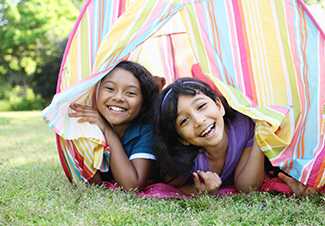Your Cart is Empty
Free Shipping on ALL alarms!
And on all orders of $35 or more *Continental US only
Free Shipping on ALL alarms!
And on all orders of $35 or more *Continental US only

Bedwetting does happen at sleepovers and summer camp! Since the world is opening up to camps and fun childhood activities, your school age child is more likely to be invited to spend the night away from your home.
Bedwetting affects about 5% of school aged children, so one or two children out of 20 will worry about waking up wet. What can you do to help?
HELPFUL HINTS
Make sure your child knows that he or she is not alone and most camps are very helpful in discreetly handling any wetting episodes.
Double voiding (urinating two times) in the hour before going to sleep is helpful.
In some cases, you can make arrangements with the camp counselor, other child’s parent or family member to continue a lifting routine if this is used successfully at home. (Lifting is when a caregiver walks the child to the bathroom at a designated time, such as when the adult goes to bed or when they are already awake themselves.)
Fluid of choice after dinner should be water. Staying well hydrated in the daytime is important so your child is not so thirsty later in the day. Drinking throughout the day allows frequent urination and fluids to be processed by the body during daytime hours.
PROTECTION
Wear disposable pants, with a plan for putting them on discreetly and disposal in the morning. If your child has outgrown traditional children’s pull-ups, there are still many options.
Disposable underwear come in all sizes, even small through extra large adult sizes. Disposable male guards can be secured to regular underwear to catch a small amount of urine.
Disposable underpads that lie on a sheet or in a sleeping bag have tape strips to hold them in place. They can be discreetly discarded in the morning. Provide an opaque plastic bag for throwing away any disposables in the waste basket in the morning.
Waterproof sleeping bag liners fit into a regular sleeping bag. They provide a comfortable, waterproof surface for sleeping without raising questions from other campers. These can be inserted in the sleeping bag before it is rolled up and remain in place until your child brings it home to be washed.
Small waterproof, washable pads can be used on top of a sheet or pinned inside a sleeping bag. They can be discreetly pulled into place when your child is ready to go to sleep.
MEDICATION
Medication, such as desmopressin, can be used temporarily to decrease the amount of urine produced at night. This medication is by prescription only and will need to be prescribed by your health care provider. It is not a cure for bedwetting and bedwetting will typically restart when the medication is discontinued. However, since it decreases urine production, many kids will achieve dryness on the nights it is taken.
The correct dosage should be determined a week or two before camp begins. One, two or three tablets may be required to keep your child dry at night. Make sure your child can swallow these small tablets as they should not be crushed. (If three tablets do not provide a dry night at home, this medicine will not work at camp, either). Have a backup plan in place.
Only a small amount of liquid (2-4 ounces) should be ingested in the hour before this medication is given, then no further fluids for the next 8 hours. It works best when given close to the time of actually going to sleep.
You can do a trial run at home, implementing the timing and the amount of medication they will use. This medication can be used sporadically for special occasions and does not need to “build up” in your system or take much time to “get out of your system”. It is a short-acting medication that peaks in a few hours. It should not be used in children with kidney problems.
PRACTICE AT HOME
Your child will be more comfortable if he or she knows exactly what to do with wetting episodes outside of your home. Practice the strategies that you have put in place a few nights at home. You can fine tune any struggles or discuss handling situations that might arise.
CURE FOR THE FUTURE
When your child or family is not travelling is a good time to tackle bedwetting by using a bedwetting alarm. This senses wetness and sounds to alert child and parents that bedwetting is happening. Over time, the body learns to hold it until morning or get up before wetting happens.
This is something that would be used in the privacy of your own home and takes a few weeks to accomplish. Starting it after camp this year or before the next school year would insure your child will be having dry nights for the next sleepover invitation.
Comments will be approved before showing up.